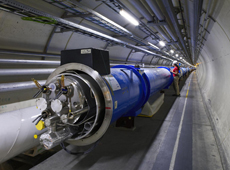Q. Do you expect that winning a Nobel Prize will change the future of subatomic research in Japan? And what do you think about the direction of future research? 

The inside of the LHC tunnel, with a circumference of 27 km (courtesy of CERN)
The paper that lead me to the award was published in 1973. Since then, the depth of our understanding of subatomic particles has changed so much, I don't see that work having a direct impact on new research. As validation of the Standard Model is nearly over, researchers will move on to the study of a new model, such as supersymmetry. For instance, by upgrading the performance of an accelerator like the B factory, it might become possible to discover unknown subatomic particles that cannot be explained with the Standard Model. Also, there will be neutrino experiments to explore leptonic CP violation at the Japan Proton Accelerator Research Complex (J-PARC), which is jointly run by the Japan Atomic Energy Agency (JAEA) and KEK. Outside Japan, the Large Hadron Collider (LHC), built by the European Organization for Nuclear Research (CERN) near Geneva in Switzerland, started operation in September 2008. This accelerator has about a 27-km circumference, and reveals a world of absolutely unknown particles produced by collisions of protons traveling close to the speed of light. A new LHC experiment will start in 2009, and many Japanese researchers are taking part in the project.
So new attempts to see beyond the Standard Model have already begun. My age won't allow me to try many new things, but I'd like to continue my pursuit, because you never know where breakthroughs might be hidden.
Q. What are your expectations for JAXA?
We are reaching the limits of what we can learn about subatomic particles with particle accelerator experiments, so observation data from space on the behavior of subatomic particles is becoming very important. JAXA and KEK have worked together on cosmic ray observations, and these researchers seem to be building a better relationship all the time. I expect there will be a lot more joint research between JAXA and KEK in the future. Or at least, I see high potential for this to happen.

The inside of the LHC tunnel, with a circumference of 27 km (courtesy of CERN)
The paper that lead me to the award was published in 1973. Since then, the depth of our understanding of subatomic particles has changed so much, I don't see that work having a direct impact on new research. As validation of the Standard Model is nearly over, researchers will move on to the study of a new model, such as supersymmetry. For instance, by upgrading the performance of an accelerator like the B factory, it might become possible to discover unknown subatomic particles that cannot be explained with the Standard Model. Also, there will be neutrino experiments to explore leptonic CP violation at the Japan Proton Accelerator Research Complex (J-PARC), which is jointly run by the Japan Atomic Energy Agency (JAEA) and KEK. Outside Japan, the Large Hadron Collider (LHC), built by the European Organization for Nuclear Research (CERN) near Geneva in Switzerland, started operation in September 2008. This accelerator has about a 27-km circumference, and reveals a world of absolutely unknown particles produced by collisions of protons traveling close to the speed of light. A new LHC experiment will start in 2009, and many Japanese researchers are taking part in the project.
So new attempts to see beyond the Standard Model have already begun. My age won't allow me to try many new things, but I'd like to continue my pursuit, because you never know where breakthroughs might be hidden.
Q. What are your expectations for JAXA?
We are reaching the limits of what we can learn about subatomic particles with particle accelerator experiments, so observation data from space on the behavior of subatomic particles is becoming very important. JAXA and KEK have worked together on cosmic ray observations, and these researchers seem to be building a better relationship all the time. I expect there will be a lot more joint research between JAXA and KEK in the future. Or at least, I see high potential for this to happen.
Q. Recently, there has been a concern about children disliking science. In your opinion, what should be done to bring their interest back?
I think it's a good idea to try to interest elementary and middle-school students in natural phenomena and let them make their own direct observations. In reality, though, science continues to diverge in a very wide range of areas, and today's advanced research is so highly specialized that it requires a certain level of knowledge to understand. To become a researcher, you must study hard in physics, math and other subjects at school in order to build a knowledge base. Otherwise, you will not be able to develop fundamental research skills. So instead of just encouraging children to have an interest in something, I think that it is more important to teach them the pleasure of the process and the step-by-step approach to learning.
Q. What is your opinion about today's university education?
Universities are cutting their budgets for basic research, and I'm afraid that this current tendency will eventually damage Japan's future. As a result of budget cuts, daily research will suffer, making it harder for young researchers to achieve results, which in turn has a negative impact on future budget decisions. So I'd like universities to show their support for basic research and help develop the fundamental sciences.
Q. What is your opinion about today's university education?
Universities are cutting their budgets for basic research, and I'm afraid that this current tendency will eventually damage Japan's future. As a result of budget cuts, daily research will suffer, making it harder for young researchers to achieve results, which in turn has a negative impact on future budget decisions. So I'd like universities to show their support for basic research and help develop the fundamental sciences.

Prof. Kobayashi as an elementary school student (courtesy of KEK)

Q. What is your message to young researchers? 
You never know where a breakthrough might occur, so please pursue various possibilities for potential research. You may not see results as quickly as you wish, but always remember to respect your ideas when you research.
Q. Finally, could you please give a message to children, too?
Nature is a very profound thing. The more you study, the more unknowns you will encounter. So it's a lot of fun to discover various things about nature. No matter how trivial it might appear to be, there is always pleasure in learning something new. It doesn't have to be about nature but could be about math or science. Please enjoy and have fun with the experience of learning - experience the pleasure of solving a puzzle or understanding something that was previously unknown.
You never know where a breakthrough might occur, so please pursue various possibilities for potential research. You may not see results as quickly as you wish, but always remember to respect your ideas when you research.
Q. Finally, could you please give a message to children, too?
Nature is a very profound thing. The more you study, the more unknowns you will encounter. So it's a lot of fun to discover various things about nature. No matter how trivial it might appear to be, there is always pleasure in learning something new. It doesn't have to be about nature but could be about math or science. Please enjoy and have fun with the experience of learning - experience the pleasure of solving a puzzle or understanding something that was previously unknown.
- Related Link:High Energy Accelerator Research Organization (KEK)